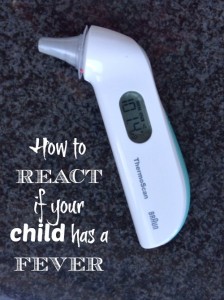Last updated on August 6th, 2024 at 08:44 am
It’s typical isn’t it, when you fly across the world and catch some kind of illness on a plane. I can’t count how many times we have returned from our vacation with one of us sick. This time was no different.
We returned Friday with jet lag beckoning us. On Saturday  Buba won’t up to find his chest tight, his cough in full motion, and a fever. It was only a matter of time before the diarrhoea set in and he turned into one grumpy tot.
Buba won’t up to find his chest tight, his cough in full motion, and a fever. It was only a matter of time before the diarrhoea set in and he turned into one grumpy tot.
By Sunday, Missy Moo had a running nose and was exhausted and feeling warm too.
Do you and your children ever get ill after riding on a plane? Here are some facts about children and fevers and how to react if your child has a fever from the Children’s Hospital.
How to React if Your Child Has a Fever
Children get ill; it’s an inescapable part of growing up. In fact, it can be a good thing, as some illnesses help the immune system to build up a resistance to more serious problems. However, one of the more problematic side-effects of childhood illnesses is a fever. By being prepared for alleviating the symptoms of a fever, you can ensure that your child’s recovery is as quick and as comfortable as possible.
What causes fevers?
Most common childhood illnesses and infections are viral in nature, and one of the ways the immune system fights them is to raise blood temperature. While this is normal, it’s important to ensure that your child’s body temperature doesn’t reach dangerous levels, as a range of potentially dangerous complications can result.
If you notice that your child has a temperature, there are a few relatively simple steps you should take:
- Make sure your child is drinking regularly.
- Check your child’s temperature at least three times through the night. It may be worthwhile having your child sleep in the same room to make this easier.
- Make sure your child is as isolated as possible
- Don’t yield to your child’s demand for more or fewer layers. Simply make sure they have bedding or clothing that is appropriate for the ambient temperature.
You should also be using an oral thermometer to take your child’s temperature at regular intervals. If the readings are higher than 39C, you can give your child the recommended dose of paracetamol or ibuprofen. Calpol and other paracetamol suspensions can be very effective – and they’re a lot easier for your child to ingest than tablets.
In most cases, your child’s temperature will come down or stabilise with a single dose. However, if that doesn’t happen, switch to an alternative medication. So, if paracetamol doesn’t seem to be working, make sure the next dose is Ibuprofen, and vice versa. You can also try following up the initial dose with one of the second medication (so your child is taking a combination of paracetamol and ibuprofen at the prescribed intervals) after around two hours if your child’s temperature won’t budge.
What if your child’s condition worsens?
In most cases, a fever will break after two or three days. However, there may be complications that require medical intervention from doctors. You should look for the following signs, and seek urgent medical assistance if any of them are present:
- Physical signs of dehydration, including a loss of colour, sunken eyes and a dry mouth.
- A fever that persists for more than three days.
- A fit.
- A rash that doesn’t dissipate when a glass is pressed against it.
- Excessive vomiting.
- A sudden deterioration in your child’s general condition.
In the vast majority of cases, a fever will simply fade away after a matter of hours. Try not to overreact by applying wet sponges and running cold baths, as fevers often don’t respond; they simply need to run their course. And don’t worry too much about feeding your child, as drinking lots of water should be the priority.
No one knows your child better than you do, so seek the advice and services of a Children’s Hospital if you become overly concerned about a fever.
I hope that Buba and Missy Moo get better soon, and the jet lag leaves us as quick as it came. It will be awhile before we fly again but it’s all worth it in the end as long as we know how to fight and deal with the colds and fevers along the way!
*This is a sponsored post.







Travelling on a plane with kids is not easy at the best of times and I have always found that this is usually when they are susceptible to something. Great advice and great to see you back. Hope your little ones are better soon. Thank you for linking to PoCoLo 🙂 x
That’s usually where I get sick too. Altogether on the plane. Been a tough week. Hoping to see the end of it free of germs.